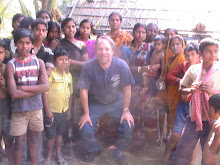Corruption finally getting its Due in Indian Media
For several years, US President Barack Obama has been pressing Afghanistan President Hamid Karzai to end corruption in his country; and he really will not get off that demand. Now, besides the fact that Obama comes from my home town, Chicago, which makes Obama's demand particularly ironic; anyone familiar with governments in South Asia knows that corruption is almost endemic and makes us Chicagoans look like rank amateurs. Remember the glee with which US leaders hailed the election of Pakistani President Asif Ali Zardari even though Zardari's monumental corruption had earned him the dubious title of "Mr. 10 Percent"? Obama had no problem sending Pakistan billions of dollars more (courtesy of US taxpayers) in care of Mr. 10 percent.
But winds of change might be blowing. I just returned from a few weeks in South Asia and witnessed something new. Previously, most Indian media coverage focused on terror attacks by Islamists and Maoists; or the budget; or elections; and all of it took a back seat to cricket. This February, however, they covered the Maoists' kidnapping one minor official, but corruption scandals (called scams) dominated the media--except of course for cricket.
The big fish caught in this net was India's now former Commonwealth Games Organizing Committee Chairman, and still high official of the ruling Congress Party, Suresh Kalmadi. There are a host of allegations against the once seemingly untouchable giant, but he says that all is well. He probably has not spoken with a couple of his aides recently who were arrested and subsequently denied bail in the matter. There is at least on sworn statement on record testifying that the witness was forced to pay a million rupee bribe. The probe was initiated after relentless investigations by the news channel Times Now. The channel has vowed to press on with its independent investigations in this any "many other scams."
Our experience in the United States and elsewhere is that the success of this sort of investigative journalism is like an addictive drug. Once the media recognizes that it has the power to effect such a sea change and help the people immeasurably, it is unlikely that they will put the toothpaste back in the tube. (Personally, I was very impressed by the Times Now on air personnel and their commitment to quality journalism.) Moreover, the people will soon see that what they once thought they had to accept can be fought--and those who try to rob the people brought down, no matter how influential they are. Hence, the importance of a case against the political heavyweight Kalmadi.
Having spent a great deal of time in South Asia, I'm familiar with the fatalism with which the people accept massive corruption. Spouses of local officials boast to each other about how much money their official/spouses have been able to pocket. In at least one case I investigated, I found that some West Bengal police stations even have a semi-official post for the person who coordinates all corruption activities. Yes, that really is the case! At the same time, you can see the effect of corruption in the horrible roads, infrastructure failings, and various other indicators that government money is not getting to the people. (I've also seen instances of corruption first-hand carried out openly.
Once the people of India recognize that they do not have to live with these injustices, it will be quite a trick if anyone on the corruption gravy train will be able to convince them that they do.
Labels: Congress Party, corruption, India, Kalmadi


0 Comments:
Post a Comment
Subscribe to Post Comments [Atom]
<< Home